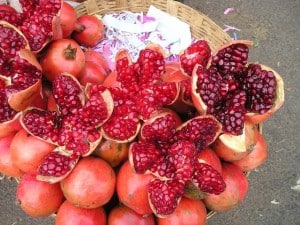
By: Amanda Froelich,
Perhaps it’s coincidence that those fruits and vegetables that most help certain organs tend to share similar appearance (examples: walnut = brain, clams = testicles, beets = kidneys, avocado = uterus, etc…). Regardless of the plant/body synchronicity, there is one fruit that scientists now relay to be one of the most powerful for eliminating arterial damage that can lead to a heart attack, the pomegranate.
Juicy, messy, and sublimely delicious, this fruit is indicated by research to be a heart-protective food which has potential to undo bodily damage caused by junk food.
This conclusion was made when researchers from Spain tested a new supplement on pigs. The supplement contained polyphenols – antioxidant compounds credited with numerous health benefits – which are found in pomegranates.
Acknowledging the controversial opinion regarding the ethical use of animals for trails, this research utilized pigs as the host for the experiment because their cardiovascular systems are similar to humans. Researchers first fed the pigs a diet of fatty, damaging foods. Unsurprisingly, this diet damaged the lining of their blood vessels; damage to the endothelium is often the first step in atherosclerosis, or hardening of the arteries which leads to heart attacks and strokes.
The fatty diet left the pigs with less elastic vessels and caused them to produce less nitric acid, a gas that keeps vessels in humans and animals healthy. As studies have already confirmed, this is similar to effects experienced in people who eat an unhealthy diet.
After the intentional vascular damage was done, the pigs were fed a daily dose of Pomanex, a supplement containing 200 mg of polyphenols. According to the researchers, the punicalagin-containing supplement was able to repair the damage.
This goes to show how consuming pomegranates can beneficially improve the arterial health of humans and pigs, alike. “Enriching a diet with pomegranate polyphenols can help in preventing and retarding endothelial dysfunctions, which are among the first signs of atheresclerosis and strokes,” said researcher Dr. Lina Badimon. Even though the study did not focus on the actual consumption of the fruit, this isn’t the first research to be conducted that suggest a heart-healthy, polyphenol rich diet is beneficial in reducing heart disease.
American Journal of Clinical Nutrition, for example, published a study indicating that pomegranate juice is able to reduce oxidative stress and plague on arterial walls. Another found men taking pomegranate juice were able to reduce the plaque in their arteries by 30% in a year’s time. The control group, who didn’t take pomegranate juice, saw a plaque increase in 9%.
Finally, one other study not related to arterial health but shows the many beneficial effects of pomegranates, was published by Center for Cognitive Neurosciences; it found that pomegranate juice can significantly improve memory and brain health.
All in all, as science continues to release confirming studies of the benefits of fresh fruits and vegetables, further incentive to consume the foods is gained. It is hypothesized that the more one consumes foods derived naturally, the healthier they will be, lending hope that in the future less disease and illness will be prevalent
Either by eating a pomegranate plain, juicing it with other fruits and vegetables or alone, and/or utilizing it in your home-cooked dishes, you can also gain the health benefits supported by various sources.
Sources:


